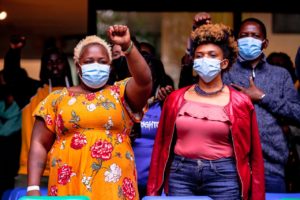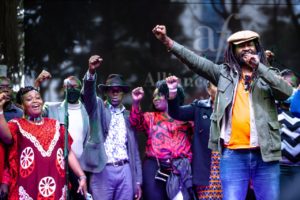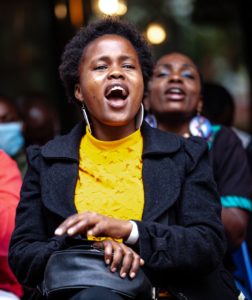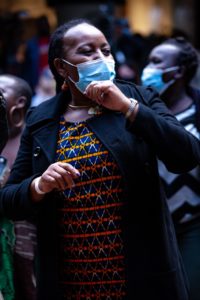Defenders Coalition successfully held the annual Mashujaa Love Concert on October 20, 2021 at the Alliance Francaise.
The annual event brought together loyal fans to spoken words artist, human rights as well as culture to honor and celebrate those who have taken part in championing for the rights and freedoms that Kenyans enjoy today.
The Defenders Coalition also used the platform to launch the premier report on the Status of Veteran Human Rights Defenders in Kenya.
See photos from the event below

















Read full report here
Defenders Coalition is pleased to share with you the premier report on the Status of Veteran Human rights Defenders in Kenya.
This baseline survey sought to establish the situation of veteran HRDs in Kenya by conducting a nationwide mapping exercise. The study was guided by three core objectives Map out veteran HRDs by identifying where they are and the work they are currently involved in Identify available opportunities that veteran HRDs can leverage on Identify and recommend organizations that the Defenders Coalition could partner with for the wellbeing of veteran HRDs.
The study makes three important contributions;
First it makes a contribution to the body of knowledge by introducing and focusing attention on veteran HRDs as a theoretical concept, social phenomenon and distinct population sub-set with unique challenge, needs and views.
Secondly, it provides insights into these unique challenges, needs and views of this sub-set based scientific research.
Finally, it provides information and specific recommendations that could help key actors achieve more relevant and effective engagement with, and interventions in advancing the protection and wellbeing of, veteran HRDs. This research has also generated a database of veteran HRDs that can be a useful foundation to build on in better documenting and managing information on veteran HRDs in Kenya.
Summary of the findings Gender distribution: Majority of the respondents were men constituting just under 2/3 of the respondents. Age distribution: Majority of the respondents were 41 years or more with most being within the age bracket of 41-50 years. Geographic distribution: Most of the veteran HRDs reached out to are found in 11 out of the 47 counties of Kenya with the majority being in Nairobi and Kiambu. Length of service: At least half of the veteran HRDs had served for 20 or more years. Current status in human rights engagement: The overwhelming majority of veteran HRDs are still action and committed to continuing engagement as HRDs. Nature of engagement: Nearly half of all veteran HRDs serve on a voluntary basis.
Read full report here
For Immediate Release October 18, 2021
Consortium Applauds Court Judgement Declaring Huduma Cards Illegal; Calls for Further Reforms.
On 14 October, the High Court struck down the Government of Kenya’s decision to roll out Huduma Cards due to violations of the Data Protection Act, 2019. The Court found that the government had started collecting personal data from Kenyans without first determining how it would protect that data and that the Government has “not appreciated the import and the extent of the application of the Data Protection Act with respect to the collection and processing of data under the National Integrated Identity Management System” (NIIMS).
The court has compelled the Government to complete a data protection impact assessment, as required by the Data Protection Act (2019), prior to processing of data or rolling out Huduma Cards.
As a consortium of organizations working on citizenship, identification, human rights, and data protection, we applaud this judgment and the enforcement of the Data Protection Act by the courts. It is paramount that relevant legal frameworks are in place and followed before collecting and managing data. We call on the Government of Kenya to comply with this judgement by conducting a robust and thorough Data Protection Impact Assessment to protect the rights of all citizens and residents in Kenya.
A Data Protection Impact Assessment is designed to identify risks that may occur through processing of data and put in place proper mitigation measures. A Data Protection Impact Assessment is critical to ensure compliance with both data protection laws as well as human rights obligations. Such assessments should involve mapping of all data processing and data flows, conducting consultation with stakeholders – which for a national initiative like NIIMS should include widespread public consultation on the purpose and risks of the system, completing a detailed risk assessment, and developing a range of measures to address the risks and ensure compliance with the law. If designed and implemented properly, a Data Protection Impact Assessment can reduce the risk of data breaches and intrusion of privacy.
We call on the Government of Kenya to follow legal requirements and international best practices on Data Protection Impact Assessments as they complete the exercise.
In addition to carrying out a proper Data Protection Impact Assessment, Kenya’s identification system and data protection regime must be reformed and strengthened in several other ways to protect the rights and serve the needs of all Kenyans. In particular, we call on the Government of Kenya to:
1. Ensure a fully inclusive identification system: The Government must ensure all Kenyans can access identification documents such as birth certificates and national identity cards prior to moving forward with Huduma Namba. If Huduma Namba is rolled
out, it must be done in phases, with a clear transition period to eliminate discriminatory treatment and expand access to documentation under the current system. There must be options for all to enroll and safeguards to protect against denial of services for those within and outside the system. By focusing on reform and access to the identification system first, the Government will reduce the risk that millions of Kenyan citizens will be left behind in the transition to digital.
2. Establish a robust legal framework and governance body via country-wide public participation: Given the extensive nature of Huduma Namba and the impact it will have on the lives of all Kenyans, there is need for a national discussion about the future of identification in Kenya, including public input into the development of anchoring legislation, the system design, a governing body for NIIMS that can be held accountable for implementation and give effect to rights enshrined in the Constitution and other applicable laws.
3. Ensure the full realization of the right to privacy and data protection: The Government must ensure Kenya has a financially independent and well-resourced data protection authority, capable of discharging its mandate under the Data Protection Act. The government ought to ensure the swift adoption of the draft Data Protection Regulations (2021). Likewise, the government must realize its responsibility to comply with the Act by guaranteeing threats to human rights are sufficiently mitigated and all necessary data protection safeguards have been implemented.
In conclusion, the Government of Kenya should not push Huduma Namba forward in blatant disrespect of the law but instead ensure the creation of an identification system and data protection scheme that protects and gives effect to all Kenyans’ rights enshrined in our Constitution.
Signed by:
1. Katiba Institute
2. Kenya Human Rights Commission
3. Heralding Development Organization (Paranet)
4. ARTICLE 19 Eastern Africa
5. Centre for Minority Rights Development (CEMIRIDE)
6. Defenders Coalition
7. Namati Kenya
8. Nubian Rights Forum
9. Access Now
10. Haki Centre




Full report here WHRD Mental Wellbeing
This study aimed at carrying out a needs assessment of the status of WELLBEING, MENTAL HEALTH and SELF CARE practices from a sample of 200 Women Human Rights Defenders (WHRDs) in Kenya to inform future interventions that are meant to prevent or mitigate mental health issues which arise as a result of their ‘work’.
WHRDs play a big role in fighting a myriad of human rights injustices and in so doing they expose themselves to the risks of developing mental health problems due to the traumatic situations they constantly face while challenging the status quo. Despite being at the forefront in defending the human rights of others, WHRDs tend to receive little or no support from formal support systems; instead, they seek support from their colleagues, as they are more often than not unattached to formal organizations. Others engage in dangerous behaviours such as alcoholism to relieve stress and relax from ‘work’.
During Focus Group Discussions, it was also revealed that some participants’ families were fearful for their physical safety, especially after the death of an activist Caroline Mwatha in 2019. This research was conducted using desk review and qualitative data analysis. Library and online sources proved crucial to this study when conducting literature review on the gaps that exist in providing support for the wellbeing, mental health and self-care of WHRDs in Kenya.
During the conduct of the qualitative research, the author collected, analyzed and interpreted the non-numerical data in a bid to understand how individual WHRDs subjectively perceive their work and the associated challenges, and how it gives meaning to their social reality1 . In the field, the researcher collected perspectives from WHRDs in several counties regarding the kind of support, services or skills that they would need to continue to address injustice, while at the same time securing their self-care and wellbeing, in order to remain mentally and physically healthy to do their advocacy. The findings from this study show that as they work to defend the rights of others, WHRDs in Kenya experience a variety of challenges such as insecurity threats, violence including (S)GBV and detention of self or family members from the government or the private sector.
Most of the respondents indicated that they or other WHRDs they are familiar with had experienced at least 80% of the mental health conditions that the researcher had listed in the study questionnaire. The challenges that WHRDs encounter at ‘work’ coupled with the strenuous and potentially trauma-inducing work puts them at risk of developing mental health problems. WHRDs in Kenya lack enough support for their mental wellbeing and selfcare from the formal support systems (most do not have a steady income), from both government and NGOs which further complicates their activism.
It was also concluded that the Kenyan government has not prioritized mental health support for its population let alone for women human rights defenders. The researcher hopes that the findings of this study will function as a bridge between the current state of affairs and the desired future – where WHRDs’ physical as well as mental needs are catered for and prioritized. It is hoped that the ultimate outcome of this assessment will be the provision of support to WHRDS where findings indicate a need for their mental health and general wellbeing be prioritized.
Thus, the main goal of this research is to mainstream mental health support for WHRDs, owing to the strenuous and potentially trauma-inducing ‘work’ they engage in. effects of such conditions by taking care of their mental health and nurturing their emotional wellbeing.
Full report here WHRD Mental Wellbeing